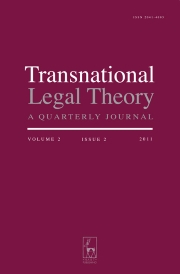 The special issue of Transnational Legal Theory entitled ‘Conflicts law as constitutional form in the postnational constellation’ is edited by co-leader of WP 9, Christian Joerges, together with Poul F. Kjaer and Tommi Ralli. It emerges from a multi-disciplinary exercise combining insights from law, political science and sociology. Common to the contributions is a preoccupation with the role of law in an increasingly globalised world. The guest editors, one jurist, one socio-legal scholar and one legal theorist, all share a deep-felt interest in the effects of globalisation and Europeanisation on legal scholarship and legal practice – and especially on the potential of a ‘conflicts law approach’ as a legal answer to the challenges posed by contemporary developments.
The special issue of Transnational Legal Theory entitled ‘Conflicts law as constitutional form in the postnational constellation’ is edited by co-leader of WP 9, Christian Joerges, together with Poul F. Kjaer and Tommi Ralli. It emerges from a multi-disciplinary exercise combining insights from law, political science and sociology. Common to the contributions is a preoccupation with the role of law in an increasingly globalised world. The guest editors, one jurist, one socio-legal scholar and one legal theorist, all share a deep-felt interest in the effects of globalisation and Europeanisation on legal scholarship and legal practice – and especially on the potential of a ‘conflicts law approach’ as a legal answer to the challenges posed by contemporary developments.
The seven articles in this special issue illustrate the problem constellation to which the evolving conflicts-law approach responds and discuss problems with, or limitations of, the approach. Christian Joerges, Poul F. Kjaer and Tommi Ralli start by discussing the ‘conflicts law approach’, which reconstructs the potential of primarily, but not exclusively, European law to address, or to ‘compensate’, the threat to democracy that is posed by the concern that citizens would increasingly be subject to the effects of laws which they themselves have not authored. Agustin José Menéndez offers an account of the conflicts law theory developed by Joerges and sets out four criticisms to the effect that conflicts law is a less than complete theory of European constitutional law. Florian Rödl argues for a democracy-preserving ‘law of conflict of laws’. In his view, a normatively adequate global law would have to rely on democratic foundations or a ‘democratically sensitive universalism’. Poul F. Kjaer connects the conflicts approach to more general problems of globalisation and transnationality. Whereas central aspects of a new concept of transnational law have already been developed, a concordant concept of transnational politics is still lacking. Kjaer thus supports the elaboration of a specific transnational concept of the political in order to complement, but not to exclude, democratic concepts of the political as developed in national contexts.
In addition to these contributions by RECON scholars, the special issue contains articles by Marc Amstutz, Martin Herberg and Michelle Everson.
The issue includes a selection of contributions to RECON Report 15, in addition to an article by WP 7 leader Agustín J. Menéndez. The RECON Report contains the proceedings from a joint RECON/CRC 597 ‘Transformations of the State’ workshop in Loccum in September 2010, which was organised as part of RECON's WP 9 – Global Transnationalisation and Democratisation Compared.
Full info
Conflicts Law as Constitutional Form in the Postnational Constellation
Special Issue of Transnational Legal Theory, Vol. 2, No. 2, pp. 153-283, 2011
Christian Joerges, Poul F. Kjaer and Tommi Ralli (eds)